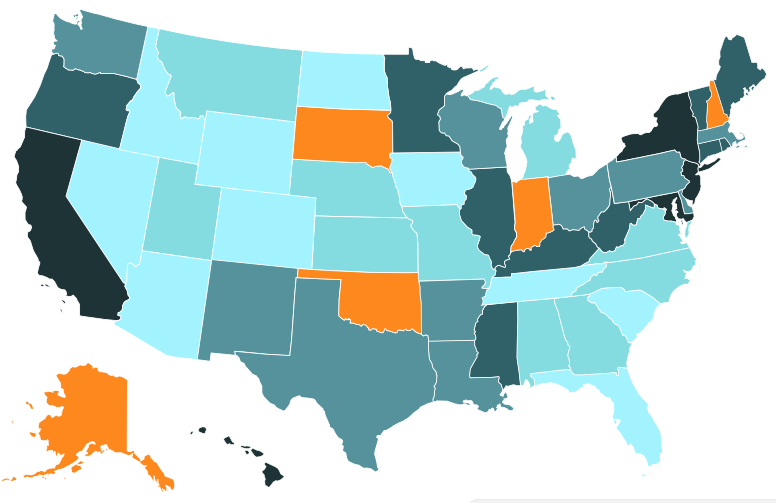When it comes to personal freedoms, Kentucky appears to be falling behind the rest of the country.
According to a recent report, Kentucky — like neighboring West Virginia — is one of the nation’s most-regulated states for economic and personal freedoms. However, unlike West Virginia, Kentucky does not appear to be improving.
Kentucky ranks second to last among the states — beating only Illinois — in growth of personal freedoms between 2000 and 2014. In fact, Kentucky saw negative growth of -0.22 percent, compared to positive growth of 0.27 percent for the national leader, Oklahoma.
Why Is Kentucky Falling Behind?
According to the report from the Cato Institute, “Freedom in the 50 States,” some troubling statistics emerged as of the end of 2014. While arrest rates for victimless crimes in Kentucky have fallen, the incarceration rate has increased despite an already high rate.
Drug arrests are above average for the state but have fallen since their height in 2006 to 2008. During that period, arrests constituted about 15 percent of the population reportedly using drugs on a monthly basis. The rate of law enforcement’s use of forfeiture revenues also is very high, the report notes.
While rights relating to guns and tobacco appear secure, those connected to alcohol and educational freedom are average. In many municipalities, local blue laws restrict various aspects of consuming and purchasing alcohol, while wine and beer taxes are high. Direct wine shipments are banned altogether, and grocery stores may not sell spirits or wine.
Meanwhile, the state offers no programs for private school choice and recently expanded legally required education to 12 years.


State and local governments in Kentucky also severely limit rights to gamble and use cannabis, and the state ranks near the bottom in travel freedoms.
High Taxes, Freedom of Land Use
Taxes are low — just under 3 percent of income — among Kentucky’s local municipalities. However, they’re much higher, 5.9 percent, at the state level. The high tax rate indicates a high level of fiscal centralization in the state. In addition, employment with the government is slightly above average, while subsidies are below average.
Kentucky offers significant freedom in usage of private land, but use of eminent domain for commercial interests does occur. The state does not have laws setting a minimum wage for workers, and it does not have a law on the books relating to the right to work.
The report also notes that freedoms relating to occupations and insurance are “mediocre.”
And despite a push by the Kentucky Medical Association to abolish Kentucky’s certificate of need program in 2006, the CON requirement remains in place. The association argued that CON stifles competition by allowing only a specific number of medical facilities to be constructed in the state — effectively creating monopolies.
In addition, the Cato Institute report notes that the state revoked the limited freedom of independent practice for nurse practitioners in 2011. In 2013, a Kentucky court invalidated the state’s regulations — which critics called anti-competitive — on moving companies.
And while types of coverages mandated as part of health insurance grew significantly in the years prior to 2010, it’s still not clear what effect the mandates will have on small groups in the future.
Kentucky’s Decline May Be Overstated
In its 2016 report, the Cato Institute noted that Kentucky’s decline in the rankings for personal freedoms — the second-largest over the 14-year survey period, just after Illinois — may be overstated. Between 2000 and 2006, the state lost approximately 0.15 points when a harsh law against gay marriage was enacted.
In addition, part of the decline was attributable to a large increase in the number of drug arrests. The report notes that the data used for drug arrests, provided by the Federal Bureau of Investigation, likely contained flaws for the state in 2000. That year’s data included incomplete response rates and may not have represented the entire state.
Kentucky has seen a gradual decline in the quality of regulatory policy, the report states, but it has experienced improvements in fiscal policy.
Recommendations for an Improved Ranking
In the report, the Cato Institute recommends several changes for Kentucky to improve the personal freedoms that citizens enjoy.
Fiscal freedoms: To lower debt, the state should make rules for municipal bond issuance stricter and should decrease spending, especially for grants to local schools, retirement and wages.
Personal freedoms: The state should try to lower the incarceration rate to the national average by reforming sentencing for individuals convicted of nonviolent crimes. In 2014, such a change would have moved Kentucky from 50th place into 45th for personal freedoms.
Regulatory freedoms: The state should pass a right-to-work law that does not violate the concept of freedom of association as described in the Bill of Rights.
On a global scale, the United States as a whole also has some work to do on its level of personal freedoms. In a list of most free countries, Canada ranks first — while the United States trails far behind, in 15th place.

Ethan Manning is an attorney with Meinhart, Smith, & Manning, PLLC.


















Just keep in mind that the Cato Institute was founded by Charles Koch to advance his agenda and seems now to be heavily influenced by the Libertarians and the Teaparty. A solution looking for a problem.